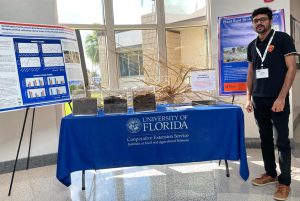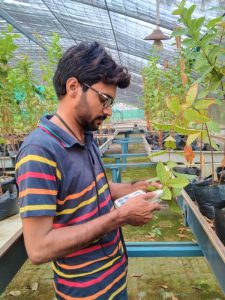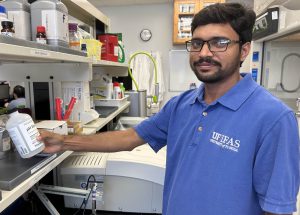
Question: You are a Ph.D. student visiting from the University of Agriculture, Faisalabad. In what topic is your research?
Answer: My dissertation involves the response of different guava genotypes under salinity stress. I work to determine which varieties are tolerant in soil saline conditions. Guava is an important crop in Pakistan. I prepared 5,000 guava trees for my doctoral research and have completed all the research at this time. But, when I return to Pakistan, I will continue the work with my dissertation. Saltwater is present in the soil near Faisalabad and in Toba Tek Singh, where I am from. To conduct the research, I studied twelve different guava genotypes and measured the
morphology, physiology, and biochemical changes inside the plants under saline conditions. I characterized the different genotypes as tolerant and sensitive in saline conditions. I found that one guava variety, Sadabahar was tolerant to salinity. When my dissertation is complete, then we will recommend Sadabahar to guava producers near Faisalabad and in Toba Dek Singh.

Question: What is the duration of your stay in the UF/IFAS-IRREC Plant Root Biology Laboratory?
Answer: I will work in Dr. Rossi’s laboratory for six months. And I am grateful for the opportunity to work in the Plant Root Biology Laboratory. The lab is well run and managed. The research is important.
Question: You are a visiting scientist from Pakistan. Please describe your background in terms of education and any positions you worked in for the industry?
Answer: My family owns a small farm in a town called Toba Tek Singh, outside of Faisalabad, where many farms operate. The farm is eight acres. I grew up on this farm. There, we grow cereal crops such as wheat and rice. When I was a child I worked alongside my father, irrigating crops, seeding, and fertilizing the crops.
Question: What crops are important in Pakistan?
Answer: Pakistan is a paradise for agriculture. Our country has a diverse climate, and our major crops are wheat, rice, maize (corn) and sugarcane. Fruit crops we produce are citrus, mango and guava. Pakistan is among the top ten producers of all these crops. Pakistan has three different climates in which to produce food crops: 1. Tropical 2. Subtropical, and 3. Temperate. But the problem we have is less yield per acre. Our crop yields are less than developed countries. Also, our crops have pests and diseases, but we can control them. We have no threats there that will destroy an entire crop.

Question: What do you hope to gain from your work in Dr. Rossi’s Plant Root Biology laboratory?
Answer: In Dr. Rossi’s lab, I work on three different crops: olives, guava, and citrus. As I noted earlier, my Ph.D. topic is guava and salinity. I will gain knowledge about tree crop root architecture.
Question: Please can you contrast agricultural research in the U.S. and in Pakistan? How is it different?
Answer: In Pakistan we work on the same topics. But we lack modernization and mechanization in agriculture, and we are seeking more knowledge about it.

Question: Agriculture is utilizing more Artificial Intelligence (AI) in operations. What do you think of AI?
Answer: AI is helping the agriculture in terms of improving productivity, to monitor the crops and site-specific use of pesticides and herbicides. The three major applications of AI are the use of drones, satellites, planes and mobile applications. These help precision in agriculture.
Question: Plant Root Biology is a fascinating field. Could you please elaborate on the topic and how it will advance food production?
Answer: Plant root biology is an interesting subject because we can study the plant’s root physiology and root anatomy. All these things are helpful to identify and quantify the potential impact of abiotic stresses. The plant is based on root health. If the roots are in good condition, the plant will also be good.
 12
12
